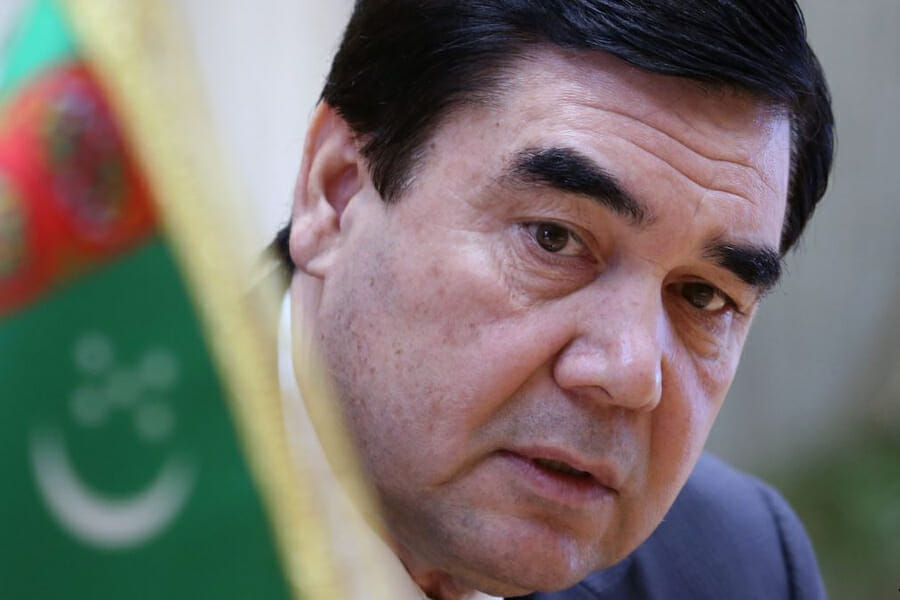
Turkmenistan, the Laggard in the Exciting Revival of Eurasian States
Question: What do Kazakhstan, Uzbekistan, and Tajikistan have in common?
The answer is that, after slow and painful reforms, each of these emerging and forward-looking Central Asian economies are leading the way for others in the region.
But there is one that lags behind, with some way to go before it can match the achievements of these three other “Stans.”
Turkmenistan looks inward which is in sharp contrast to the other three.
Human Rights Watch describes it as one of the most “repressed and closed” countries in the world with almost zero political freedom and a stiflingly unreformed economy.
While political policing and imprisonment have been phased out elsewhere in Eurasia, dozens who were arrested throughout the late 1990s and early 2000s remain detained by the state. The UN Human Rights Council has made 188 recommendations for reforms which have gone largely ignored: notably the call to end the practice of torture. President Gurbanguly Berdimuhamedow has aping his predecessor Saparmurat Niyazov, established a personality cult that includes surreal public stunts and outlandishly expensive statues of himself. The government retains absolute control over the media, and independent reporting is all but non-existent within the country.
Lack of political openness is intertwined with economic stagnation and an inhospitable business environment. The IMF has made strong recommendations that Turkmenistan should cut spending or devalue its currency, given its 3-digit current account deficit. However, unlike its more forward-looking neighbours in the region, Turkmenistan’s currency, the manat, is governed by tight foreign exchange control. The US State Department believes that Turkmenistan may be in an undeclared recession.
Respect for property rights is particularly scant, with the appropriation of corporate assets becoming a habit of the regime. A former investor, Oguzhan Cakiroglu, said that the government “has run out of financial resources” and has not been paying its contractors for three years. Lotus, an investor, was forced to appeal for arbitration after non-payment of contractual dues for construction work on two electric plants.
Adem Dogan, another company, received extensive damages after state appropriation of agricultural assets, and MTS is currently undergoing litigation concerning unilateral actions by the state telecom company that led to its network being forcibly disconnected. Given that MTS was the only genuine private sector alternative to the state monopoly, the contrast with Uzbekistan’s private sector telecoms renewal could not be starker.
Positive economic sounds emerged from Central Asia last month with the announcement of Uzbekistan’s sovereign bond debut, which saw demand skyrocketing to as much as $8.5 billion, making the issue, which launched with yields of 4.75% on the 5-year note and 5.37% on the 10-year note, 8.5 times oversubscribed according to Bloomberg.
Fund manager Anders Faergemann, whose company holds extensive assets in the country, described the sale as a “positive, transition story.”
The hugely successful issue follows a pattern of slow but successful economic and social reforms in the ex-Soviet republic, placing it, alongside Kazakhstan, as the most promising of the emerging Central Asian economies. Uzbekistan is Central Asia’s most populous country and is perceived as offering regional leadership in what has historically been a deprived part of the world; where it goes, others may follow suit.
Uzbekistan was until recently one of the world’s most isolated countries under the dictatorship of the tyrannical President Islam Karimov. After taking control of the country following independence from the USSR in 1991, Karimov followed an autocratic textbook of state control of the economy and appalling abuse of human rights. Uzbekistan made routine use of torture and detained large numbers of political prisoners as well as using forced labour in its vast cotton fields (a significant portion of the economy).
However, President Shavkat Mirziyoyev, who took over in December 2016, has made rapid progress only two years into his administration. He was initially expected to govern much as his predecessor, especially given his complicity in the brutality of the previous government, but he has exceeded expectations, being hailed as a reformer and a catalyst for progress in the region in a 2018 visit to the White House. Helen Fraser, the UN resident coordinator in Uzbekistan, told Al Jazeera that “the reform agenda that the president launched in February last year, the Action Strategy, is very well aligned with what the UN is working towards globally through Agenda 2030.”
These reforms have included freeing the country’s currency, normalising relations with neighbours, opening up the previously secretive courts to online public viewing, tackling corruption by reforming public administration and the phasing out of forced labour. Trade liberalisation through the reduction of import barriers alongside the floating of the currency has earned praise for the republic from the World Bank. Human Rights Watch confirms that almost all political prisoners have now been released and the country’s reforms have received praise from the White House.
Moves towards political and economic openness have yielded dividends in terms of foreign direct investment with foreign capital eyeing up new opportunities in gold and tungsten mining to add to the €286 million metallurgy plant being built by MetProm. Action has been taken to tackle corruption in government procurement with the former president’s daughter, who demanded enormous bribes from telecom companies, now under house arrest for her crimes. In a sign of the changing times, Swedish telecom company Ericsson is returning to Uzbekistan after being driven out by the erratic actions of the previous government.
Other states in the region have been making similar progress, with Kazakhstan establishing the Astana International Finance Centre which will be regulated under English law with an independent arbitration centre and an exchange. Tajikistan has witnessed surging economic growth, reaching a peak of 7.1% which the World Bank attributes this to private consumption, exports and public investments. The Tajik economy is expected to benefit from stable commodity prices, increased private business activity, and increased liberalisation and has already seen its poverty rate slowly but continuously decline.
With the inheritance of state-run economies, it is not surprising that the ex-Soviet states in Central Asia have been liberalizing at an uneven rate. It is, however, clear that while Kazakhstan and Uzbekistan are leading the way, Turkmenistan remains fossilised. There is still some way to go for all of the Turkic republics, but the outlook for the future is notably brighter in some economies in Central Asia than in others.

